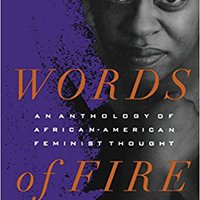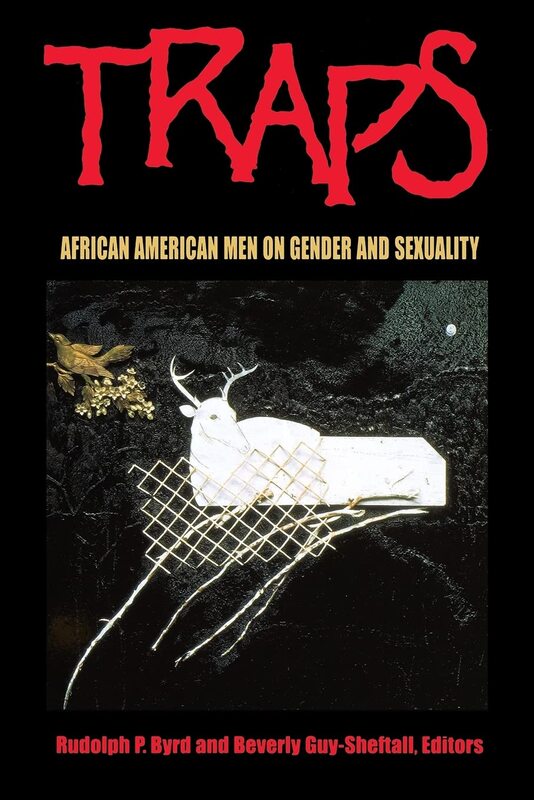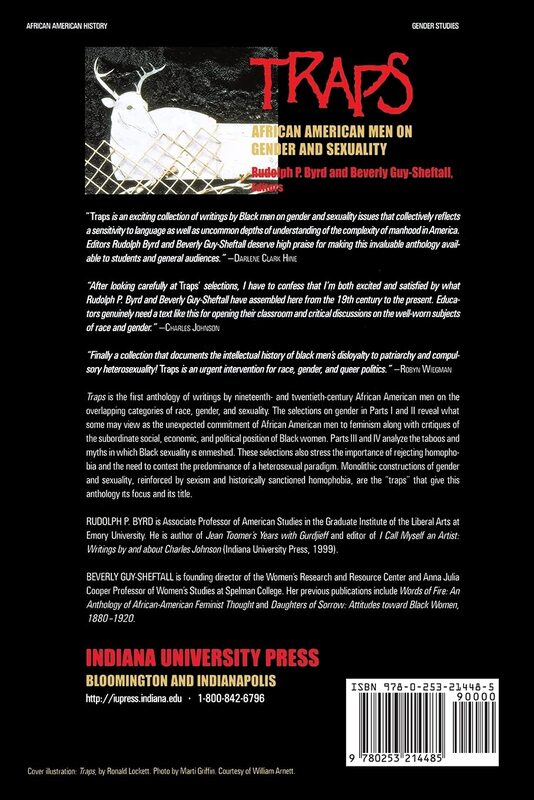Traps: African American Men on Gender and Sexuality
Item
-
Title
-
Traps: African American Men on Gender and Sexuality
-
This edition
-
"Traps: African American Men on Gender and Sexuality". Ed. Rudolph P. Byrd and Beverly Guy-Sheftall. Bloomington: Indiana UP, 2001. 400 pp.
-
Table of contents
-
● Preface
● Acknowledgments
● Rudolph P. Byrd / Prologue: The Tradition of John: A Mode of Black Masculinity
Part One: Remembering Our Forefathers: Pioneering Perspectives on the Rights and Education of Women
● Frederick Douglass / The Rights of Women
● Frederick Douglass / Give Women Fair Play
● Frederick Douglass / I Am a Radical Woman Suffrage Man
● Alexander Crummell / The Black Woman of the South
● W. E. B. Du Bois / The Damnation of Women
● Gary L. Lemons / "When and Where [We] Enter": In Search of a Feminist Forefather--Reclaiming the Womanist Legacy of W. E. B. Du Bois
Part Two: Disloyalty to Patriarchy: Resisting Sexism
● Benjamin E. Mays / In the Days of My Youth
● Bayard Rustin / Feminism and Equality
● Kalamu Ya Salaam / Women's Rights Are Human Rights
● Manning Marable / Groundings with My Sisters
● Calvin Hernton / Breaking Silences
● Haki R. Madhubuti / On Becoming Anti-Rapist
● Derrick Bell / The Sexual Diversion: The Black Man/Black Woman Debate in Context
● Michael Awkward / A Black Man's Place in Black Feminist Criticism
● Nathan McCall / Men
● Morehouse College / Mission Statement of Black Men for the Eradication of Sexism, Morehouse College
Part Three: Meditations from the Heart: Making Meaning Out of Masculinity
● James Baldwin / Here Be Dragons
● Arthur J. Robinson, Jr. / In the Limelight
● Kevin Powell / The Sexist in Me
● Charles Johnson / A Phenomenology of the Black Body
● Henry Louis Gates, Jr. / Thirteen Ways of Looking at a Black Man
● Gerald Early / Mike's Brilliant Career
● Robert F. Reid-Pharr / It's Raining Men
● Men Stopping Violence / Dear Minister Farrakhan
● Edward Guerrero / Black Men in the Movies
Part Four: Brother to Brother: The Politics of Desire, Sexuality, and Homophobia
● Huey P. Newton / A Letter from Huey to the Revolutionary Brothers and Sisters about the Women's Liberation and Gay Liberation Movements
● Joseph Beam / Brother to Brother
● Marlon Riggs / Black Macho Revisited
● Essex Hemphill / Does Your Mama Know about Me?
● Cornel West / Black Sexuality
● Michael Eric Dyson / When You Divide Body and Soul, Problems Multiply
● Kendall Thomas / "Ain't Nothin' Like the Real Thing": Black Masculinity, Gay Sexuality, and the Jargon of Authenticity
● Beverly Guy-Sheftall / Epilogue: Reflections of Black Manhood
● Selected Bibliography
● Biographies
● Index
-
Reviews and notices of anthology
-
● Walker, Clarence E. "Journal of Southern History" 69.2 (2003): 453-54.
"Like a number of recent works dealing with black culture and politics, Rudolph Byrd's prologue situates this volume in what I would call "therapeutic studies." Byrd wants black men to recapture the masculinist ethos of the mythic slave character High John the Conqueror, who embodies "[a] mode of masculinity for Black men who are committed to the liberation and survival whole of Black people," and who triumphed "over 'Old Massa' through motherwit, laughter, and song" (p. 1). These are admirable characteristics, but just what their relevance is to life in a postindustrial society is not clear. Several of the essays in this volume speak to problems that cannot be solved by "motherwit, laughter, courage, hope, as well as the regenerative powers of song, love, and the spirit" (p. 5). These culturalist formulations do not address the multiple, structural inequalities that characterized black life in both the nineteenth and twentieth centuries. Black men need something more than a nineteenth-century mythic figure to shape their sense of manhood. This is clear when you read the pieces in this collection by Benjamin E. Mays, Calvin Hernton, James Baldwin, Henry Louis Gates Jr., Essex Hemphill, Cornel West, and Kendall Thomas. Their essays and several others point out the myriad ways American society has malformed black manhood. . . . Ultimately, what black men living in the twenty-first century need is a usable present--not a usable past. The well-intentioned efforts of the editors of 'Traps' miss this point."
-
See also
-
● Carbado, Devon W., ed. "Black Men on Race, Gender, and Sexuality: A Critical Reader." Foreword by Kimberlé Williams Crenshaw. New York: New York UP, 1999.
-
● Lemons, Gary L. "Black Male Outsider: Teaching as a Pro-Feminist Man." Albany: SUNY Press, 2008.
-
Google Books (limited preview)
-
Item Number
-
A0568
 Words of Fire: An Anthology of African-American Feminist Thought
Words of Fire: An Anthology of African-American Feminist Thought


